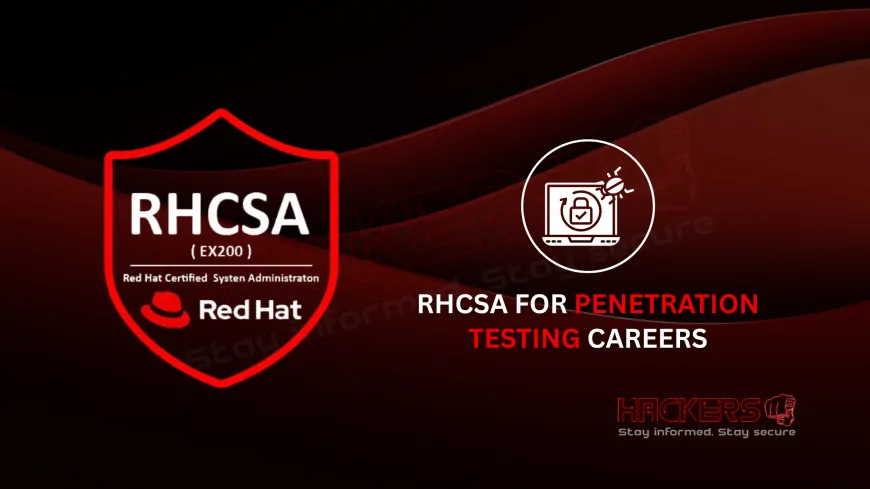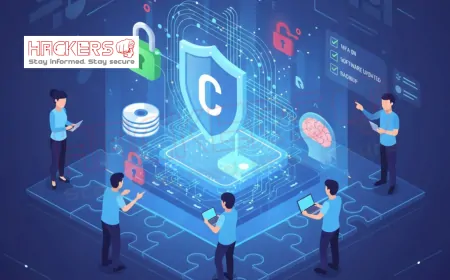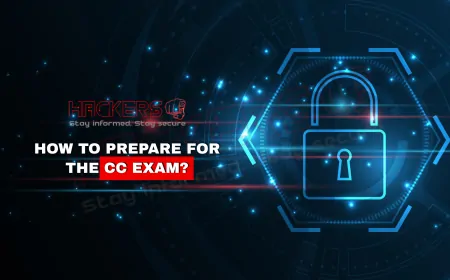How RHCSA Can Be a Gateway to a Career in Penetration Testing
Imagine being a digital detective, probing systems to uncover hidden weaknesses before cybercriminals exploit them. That’s the thrilling world of penetration testing, where ethical hackers test networks and servers to bolster security. In 2025, with cyber threats like ransomware and phishing surging, penetration testers are in high demand. But to excel, you need to master Linux, the backbone of most servers and hacking tools. The Red Hat Certified System Administrator (RHCSA) certification is your gateway to this exciting field, offering beginner-friendly Linux skills that empower you to navigate, test, and secure systems. In this blog, we’ll explore how RHCSA opens doors to a penetration testing career, using simple language to guide newcomers and IT pros alike. Ready to hack your way to success? Let’s dive in!

Table of Contents
- What is RHCSA?
- What is Penetration Testing?
- Why Linux is Essential for Penetration Testing
- RHCSA Skills for Penetration Testing
- Practical Applications in Penetration Testing
- RHCSA vs. Other Certifications
- Career Path to Penetration Testing
- Why Choose Webasha for the Course
- Conclusion
- FAQs
What is RHCSA?
The Red Hat Certified System Administrator (RHCSA) is an entry-level certification from Red Hat, a leader in open-source software. It focuses on managing Red Hat Enterprise Linux (RHEL), a robust operating system powering servers and clouds worldwide. Linux is open-source, meaning its code is freely customizable, making it a favorite for secure and flexible systems.
RHCSA, tested through the EX200 exam, is hands-on. You perform real tasks—like managing users, setting permissions, or configuring firewalls—on a live system, proving practical skills. It’s designed for beginners with basic IT knowledge, requiring no advanced experience. For a detailed syllabus, check this RHCSA course details blog from Webasha.
For penetration testing, RHCSA is a perfect starting point. It teaches you to navigate and secure Linux systems, which are common targets in pentesting, setting you up for a rewarding career.
What is Penetration Testing?
Penetration testing, or pentesting, is the practice of ethically hacking systems to find vulnerabilities before malicious hackers do. Pentesters simulate attacks—probing networks, servers, or apps—to identify weaknesses like weak passwords or open ports. They then recommend fixes to strengthen security.
In 2025, pentesting is critical as cyber threats grow. Ransomware can lock data, phishing scams steal credentials, and unpatched systems invite exploits. Pentesters use Linux-based tools like Kali Linux, Metasploit, and Nmap, making Linux expertise essential. RHCSA provides the foundational skills to understand and secure these systems, making it a vital step for aspiring pentesters.
Why Linux is Essential for Penetration Testing
Linux powers over 70% of web servers, most cloud platforms like AWS, and security tools like Kali Linux, making it a prime target for cyberattacks. Pentesters need Linux skills to:
- Navigate Systems: Explore servers to find misconfigurations or vulnerabilities.
- Test Security: Simulate attacks on Linux services like SSH or Apache.
- Secure Systems: Recommend fixes, like tightening permissions or enabling firewalls.
- Use Pentesting Tools: Run Linux-based tools like Nmap for network scanning or Wireshark for packet analysis.
Without Linux knowledge, pentesters are limited in their ability to test or secure systems. RHCSA bridges this gap with practical administration skills, making it a gateway to pentesting.
RHCSA Skills for Penetration Testing
RHCSA teaches Linux administration skills that directly support penetration testing:
- User Management: Use
useraddandpasswdto understand account setups, helping you test for weak credentials or unauthorized users. - File Permissions: Master
chmodandchownto analyze file access, identifying vulnerabilities like overly permissive files (e.g.,/etc/passwd). - SELinux Basics: Configure Security-Enhanced Linux to restrict processes, allowing you to test if policies block exploits like privilege escalation.
- Firewall Configuration: Use
firewalldto manage network traffic, enabling you to probe open ports or suggest rules to block attacks. - Software Management: Check for outdated software with
dnf list installed, identifying exploitable vulnerabilities. - Log Analysis: Review logs with
journalctl(e.g.,/var/log/secure) to detect signs of attacks, like brute-force attempts. - Network Services: Configure services like SSH or Apache, understanding their setup to test for misconfigurations.
These skills give pentesters the ability to understand systems deeply, find weaknesses, and propose fixes, making RHCSA a critical foundation.
Practical Applications in Penetration Testing
Here’s how RHCSA skills apply to pentesting tasks:
- Testing User Accounts: Use
whoorlastto check active users, simulating attacks to find default or weak accounts. - Probing File Permissions: Analyze permissions with
ls -lto find sensitive files (e.g.,/etc/shadow) with incorrect access, a common exploit path. - Assessing SELinux: Test SELinux policies with
sealertto see if they prevent unauthorized actions, recommending stronger settings. - Scanning Ports: Use
firewalldknowledge to identify open ports (e.g.,firewall-cmd --list-all), then test them with Nmap. - Checking Software Vulnerabilities: Verify patch levels with
dnf updateinfo, identifying software exploitable by tools like Metasploit. - Monitoring Logs: Analyze logs with
journalctl -u sshdto detect simulated attacks, like brute-force logins, and suggest monitoring tools. - Testing Service Configurations: Examine SSH settings in
/etc/ssh/sshd_configto find weak authentication methods, recommending key-based setups.
These applications show how RHCSA skills enable effective pentesting. For real-world examples, see this RHCSA success story.
RHCSA vs. Other Certifications
How does RHCSA compare to pentesting certifications like CEH or CompTIA PenTest+? Here’s a table:
| Aspect | RHCSA | CEH | CompTIA PenTest+ |
|---|---|---|---|
| Focus | Linux administration | Ethical hacking, tools | Penetration testing basics |
| Pentesting Skills | System understanding, security | Hacking techniques, exploits | Testing methodologies |
| Exam Style | Hands-on, performance-based | Multiple-choice | Multiple-choice, simulations |
| Prerequisites | Basic IT knowledge | Basic security knowledge | Network+, Security+ recommended |
| Best For | Linux system foundation | Hacking techniques | Entry-level pentesting |
RHCSA’s Linux focus complements pentesting certs like CEH, providing a strong foundation for system-level testing. For more, see this RHCSA overview blog.
Career Path to Penetration Testing
RHCSA sets you on a clear path to a pentesting career:
- Start with RHCSA: Gain Linux administration skills to understand systems.
- Build Experience: Work as a Linux Admin or Security Analyst, applying RHCSA skills.
- Add Pentesting Certs: Pursue CEH, OSCP, or PenTest+ to learn hacking techniques.
- Advance to RHCE: Gain advanced Linux skills for enterprise pentesting roles.
- Land Pentesting Roles: Secure jobs like Penetration Tester or Security Consultant.
RHCSA’s hands-on skills make you a versatile candidate, ready to grow in cybersecurity. For career guidance, check this Red Hat career guide.
Why Choose Webasha for the Course
To kickstart your pentesting career with RHCSA, Webasha Technologies is a top choice, especially in India. With years of experience training thousands, Webasha offers RHCSA courses with hands-on labs that mirror the EX200 exam. Their expert instructors simplify Linux concepts, making them accessible for beginners.
Webasha provides flexible learning options—online, classroom, or bootcamps—along with affordable fees and job placement support. Their practical approach ensures you’re ready to navigate and secure systems, a key step toward pentesting. For exam prep tips, see their RHCSA exam tips blog. Webasha is your gateway to a thriving pentesting career.
Conclusion
RHCSA is a powerful gateway to a penetration testing career, providing essential Linux skills to navigate, test, and secure systems. From user management to SELinux and firewalls, it equips you to understand targets and identify vulnerabilities, complementing pentesting certifications like CEH. In 2025, with Linux powering most servers and cyber threats on the rise, RHCSA opens doors to exciting roles. Whether you’re a beginner or an IT pro, this certification sets you on a path to success. Ready to start your pentesting journey? Enroll with Webasha and take the first step today!
FAQs
What is RHCSA?
RHCSA is an entry-level certification teaching Linux administration and security skills.
What is penetration testing?
It’s ethically hacking systems to find and fix vulnerabilities.
Why is Linux important for pentesting?
Linux powers most servers and pentesting tools, requiring deep system knowledge.
How does RHCSA help pentesters?
It teaches Linux skills to navigate, test, and secure systems.
What RHCSA skills aid pentesting?
User management, permissions, SELinux, firewalls, and log analysis.
Is RHCSA beginner-friendly?
Yes, it requires only basic IT knowledge.
Can RHCSA improve pentesting skills?
Yes, it helps understand and secure Linux systems during tests.
What is SELinux in RHCSA?
A security module restricting process actions to prevent exploits.
Does RHCSA teach firewall skills?
Yes, it covers firewalld to manage network traffic.
Can RHCSA help use pentesting tools?
Yes, it aids in running Linux-based tools like Nmap.
What jobs can RHCSA lead to?
Linux Admin, Security Analyst, or entry-level pentesting roles.
How long is RHCSA training?
Typically 3-6 months with consistent study.
Is the RHCSA exam hands-on?
Yes, it tests real tasks like securing systems.
Does RHCSA expire?
Yes, after three years; renew with exams or credits.
How does RHCSA compare to CEH?
RHCSA focuses on Linux administration; CEH covers hacking techniques.
Can RHCSA secure cloud systems?
Yes, it applies to Linux-based clouds like AWS.
Why learn log analysis in RHCSA?
It helps detect attack attempts, like brute-force logins.
Is RHCSA globally recognized?
Yes, Red Hat certifications are valued worldwide.
Can RHCSA lead to CEH or OSCP?
Yes, it provides a foundation for advanced pentesting certs.
Why choose Webasha for RHCSA?
Webasha offers hands-on training, expert instructors, and job support.
What's Your Reaction?










































































